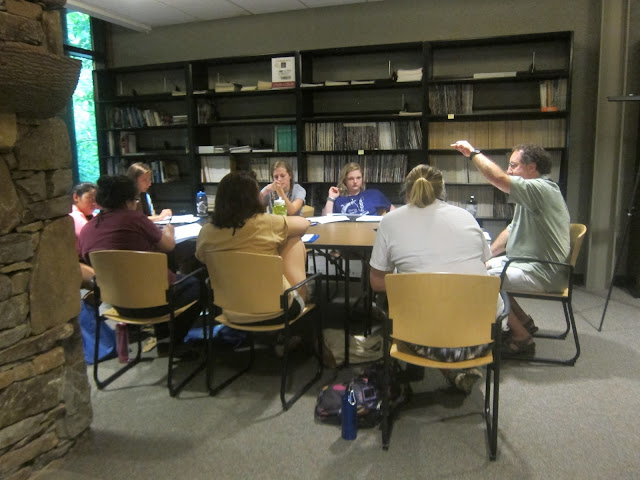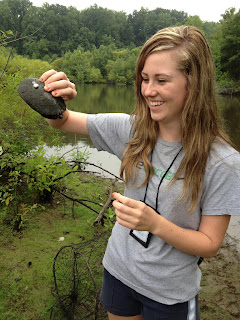Alumni Profile: Savannah, Animal Rescues and (Wolf)Puppy-Love
 |
| Savannah and her wolfdog, Mesa |
If there is anyone who could give Dr. Doolittle a run for
his money, it would be Savannah Spratt. Savannah, an attendee of the first-ever
National Environmental Summit in 2011, has always known she wanted to work with
animals. “For as long as I can remember, even when I was a kid, I always knew
that was something I wanted to do.” Growing up, she was exposed to subjects of
the environment constantly through her school’s own nature trail, natural
history museum, and butterfly sanctuary. Throughout high school, she remained
involved with her interests through environmental clubs and by volunteering at
Friends of Animals, a local animal shelter. “I just feel like it was ingrained
in me as a kid. And I was one of the few kids from that school who became
really interested and kept up with that sort of thing. […] I was always keeping
myself busy trying to be a biologist and an activist for as long as I can
remember.”
In 2011, Savannah attended the Summit and joined Dr. Joe
Poston’s focus group A
Backbone for Conservation, a vertebrate tracking group with
which she caught turtles in the Center’s preserve, attached video-trackers to
the turtles, and learned how to track them using GPS and radio-trackers. It was
her favorite part of the Summit, and as a whole, she enjoyed the experience so
much that she returned the next summer, this time joining Dr. Jay Bolin’s focus
group Invasive
Species: Friend or Foe of the Environment?
She knew she wanted to work with animals in her future
career, but she didn’t quite know what she wanted to do with them. The project she did that second
year however helped give her some sense of direction. “With
the focus groups, they had us narrow in on something, and I really had fun with
the invasives project.” She says, “We captured some native clams and some
invasive clams and did filtration studies on both of them and it turns out the
invasive clam was more efficient at filtrating, and I just thought that was so
interesting. So during college, I did an internship and I was looking for stuff
sort of like that.”
She ended up interning as an assistant park ranger at South
Mountain State Park, a position in which she helped with the removal of harmful
invasive species as well as with outreach and education efforts for the public.
After graduating high school, Savannah pursued a degree in
Biology from Mars Hill University, with a concentration in Ecology and a minor
in Environmental Studies. She found that participating in the Summit’s tracking
project as a teenager gave her an edge later when taking a course in college on
Geographic Information Systems Mapping (or GIS), which used GPS as an
introduction to GIS technology. Her experience also helped her when she took
part in an invasive species project as part of her Environmental Studies minor.
“I feel like it was really good for me because it made me feel like I already
knew what I was talking about. It made it easier for me, I guess.”
Throughout
her college years, she also remained close to animals by engaging in volunteer
work at the Full Moon Farm, a wolfdog sanctuary in Black Mountain, North
Carolina. She has worked with them for four years, and actually has a foster
wolfdog of her own named Mesa. “I think I really want to focus on animal rescue
and wildlife rehab.” She says, “But also sustainability…there’s still so much I
want to do.”
“A lot of people
don’t really know how to handle these dogs; you know, they still have the wolf
in them. They don’t understand them- they think they’re going to be these
awesome, cool-looking pets and then they don’t know how to handle them, but
they can’t go to regular pet shelters because of what they are.” Picture by Savannah Spratt.
Upon her graduation from Mars Hill,
she began working at Brother Wolf Animal Rescue, a local animal shelter housing
mostly dogs and cats. She speaks about her work with animals with sweetness and
excitement. “We also take in small animals like guinea pigs, hamsters, rabbits.
We even had two parakeets; we take in turtles. And now we’re opening up a
sanctuary where we rescue pigs and cows from meat farms.”
She is currently pursuing a master’s degree in Environmental
Studies from Green Mountain College and continues to work with the wolfdogs at
Full Moon Farm. She is also pursuing her wildlife rescue license, after which
she hopes to begin working with Appalachian Wildlife Refuge to provide foster
care and rehabilitation to weak and wounded wildlife.
To teenagers thinking about the possibility of
joining this year’s Summit, she says: “I just think that it’s a really good
experience; I would encourage anybody to do it. I mean, I went twice because I
had so much fun the first time. It’s like- you get out, you get dirty and you
get muddy, and you have fun, and you hang out outside with a lot of
people, but it’s also like… crafting. Getting together with a group of people
[and] having fun [while] learning, which is the best way to learn.” And I feel
like they did a really good job coming up with ways to accommodate for
everybody’s needs. They had all sorts of food options for everybody. I thought
it was really great.
We all had groups, we hung out together, I think we became
close over the week, or two weeks, that we were there. It was a lot of fun and
I hated to leave and I know everyone else did too. It was really awesome.”




Comments
Post a Comment